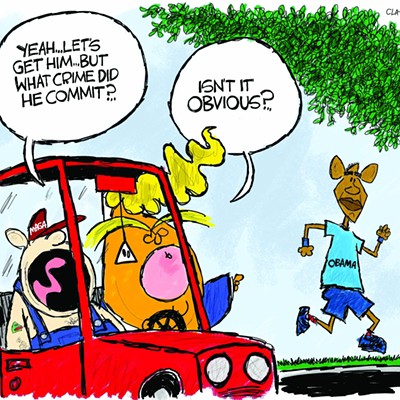Our national myth--that we are a paragon among nations--requires us to gasp in horror when we see American soldiers act in ways that do not fit the fictions we embrace. President George W. Bush gave voice to those fictions when he claimed, referring to the abused prisoners, "Their treatment does not reflect the nature of the American people."
Just what is this illusive "nature," and where did it spring from? Did it manifest itself when early settlers burned women at the stake? Do we see it among the nation's founders who believed it was their God-given right to keep slaves? Did it come to bear during the Indian wars, when we slaughtered our way across the land?
Or perhaps our "nature" became apparent in more modern times: in World War II when we interned Japanese-Americans, then stole their land; or in Vietnam, where, in the case of the My Lai massacre, we heard the "only following orders" defense, those words that soldiers use like shields after committing unconscionable acts?
Horror is intrinsic to war, and to pretend otherwise is naïve, said one veteran. He was a member of an elite force engaged in covert operations during the Vietnam War--operations he still can't, or won't, speak of. As a young man, he witnessed the kinds of acts most Americans would prefer to believe never occur.
He spoke passionately about the abuse in Iraq, and said he "guaranteed" that someone from U.S. intelligence forces told the military police in charge of guarding the prisoners to strip the prisoners naked in order to prepare them for interrogation--nudity being especially humiliating to Muslims, he noted.
Combat vets would "just as soon see political prisoners dead," he said, adding, "I can't tell you how many times POWs in Vietnam 'accidentally' fell from helicopters. It was not uncommon." Instances of abuse are not exceptional, he said, and "anyone who thinks otherwise is stupid."
For one Tucson reservist, who served 11 months and recently returned from Iraq, what occurred in Abu Ghraib was "trivial" and did not come as a surprise. But, he said, because the United States military committed the abuses, the element of hypocrisy made them appear more egregious than they really were. He is certain the intelligence community put pressure on the guards to do what they did.
Perhaps by the time you read this, Rumsfeld will have "taken the bullet," in the words of one British commentator, and resigned. Though it's an unlikely scenario, it is possible. Not that it would make any difference: Neither Rumsfeld, nor the Pentagon, nor any individual is solely responsible for what happened. The blame rests on all of us and our collective failure to disavow war as a means to resolve conflict.
Despite the Geneva Conventions, and despite the best intentions and work of honorable men and women, the very nature of war will always elicit humans' most heinous behavior. To think otherwise is to deny our capacity for revenge. If you have been in combat for months and seen your friends meet a torturous death, it's unlikely you will react with kindness when you encounter "the enemy."
Each time we engage in war, regardless of the outcome, we have already admitted defeat. War is a testament to our weakness, not our strength. When we resort to battle, we abandon reason in favor of the visceral. We abandon the idea that to take another life is the ultimate act of hubris. And despite the technological sophistication of our weapons, we are neither better nor different than our ancestors, fighting with clubs and spears.
Some people believe nations will always wage war on each other--the old "it's always been this way and it always will be" argument, the idea that war is an inherent part of "human nature." Perhaps they are correct. Perhaps greed, hatred and the persistent vision of the Other as someone apart from us will trump acknowledging our commonality. Perhaps we will choose to condemn ourselves to endless iterations of violence spawning violence as we draw the curtains, retreat in fear and ignore the small voice inside us that whispers, "It doesn't have to be this way."






